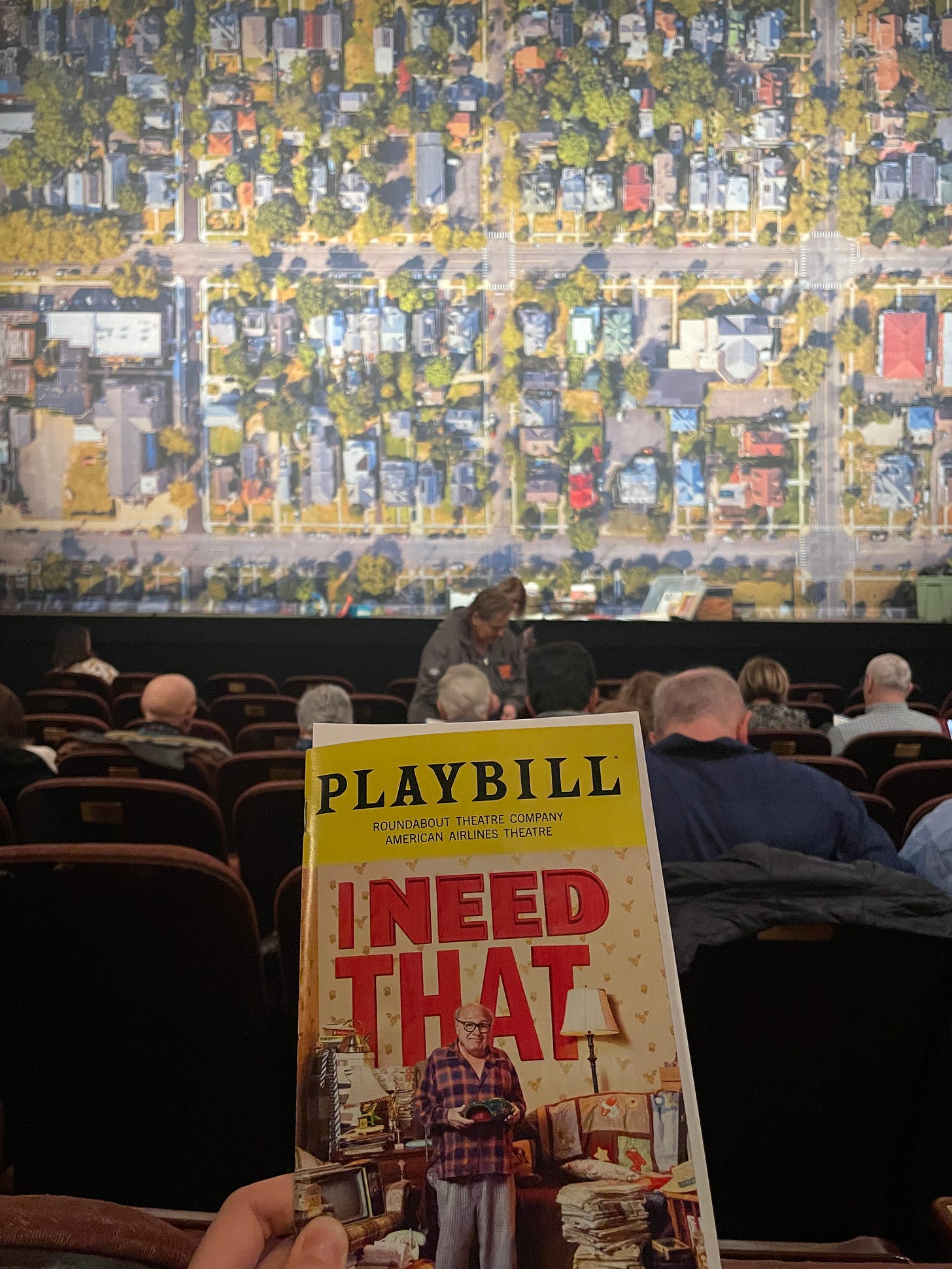“I Need That,” AKA Clutter, a Nepo Baby, and Feeling Sentimental About Things
Yes, this is the play Danny DeVito and his daughter are in.
Danny DeVito’s on Broadway for a few more weeks, and this week we’re talking about the hoarding play: “I Need That,” where my grandparents and I have different (but the same?) takeaways.
Here’s the gist:
How I found out about it: Honestly, I want to say a subway ad, but I’m not sure. I really just remember seeing Danny DeVito’s face somewhere not on my phone. My grandparents are long-time members of Roundabout (the company that produced this show), and my grandma heard about this from them.
Why I went: My grandparents! Seeing Danny DeVito live was cool, but I don’t think his celebrity status nor the play’s plot would have motivated me enough without them.
How I got tickets: My grandparents :) Do you sense a theme? If you’re looking for cheaper tickets to Roundabout Theatre shows, join their Hiptix program. You can get two $30 tickets to any of their shows if you’re 18-40, and your guest can be any age.
When “I Need That” ended, my grandpa turned to me and said, “That really makes you feel something when you’re our age.”
I can understand why he feels that way. “I Need That” follows Sam (Danny DeVito), an older man who doesn't want to leave his very crowded, messy home of various old items. As Sam’s daughter, Amelia— played by Danny DeVito’s actual daughter (!!), Lucy DeVito — warns us, Sam is facing eviction if he doesn’t clean up his home. Sam is a very classic grouchy old man about it, telling his daughter he’s very happy with his home because every memento is important. We learn partway through the show that Sam has lost his wife, and the clutter is symbolic of his attempt to hold onto those memories.
While Danny DeVito is funny and stubborn and loving as an older dad, he doesn’t always have the best material to work with. This show feels somewhat inevitable. In the beginning, we see a house cluttered with materials: piles of board games, books, and even a big load of stuffed animals. (At one point, Danny DeVito pulls out an old game of Sorry and plays by himself on stage, which is maybe worth a ticket.) We hear concerns from Amelia and his best friend, Foster (Ray Anthony Thomas), who very blatantly give the sense of urgency that if Sam doesn’t get his act together, he’ll be thrown out. It felt immediately clear to me that the end of the show was not going to end in an eviction, and instead we would see the clean, uncluttered home. And while the reveal of that is somewhat magical — the living room we see for most of the show gets turned around, to reveal the front of the house, then turned again to a nearly spotless room — it feels predictable.
The warmest moments of the show are mostly saved toward the very end, when Amelia reveals that she is struggling with her career, her apartment, and her life. (Critic Jesse Green says she’s no nepo baby, and while she gives a good performance, especially in these last scenes, I don’t know if I’d go that far). She’s been avoiding her own challenges by throwing her energy into her dad. Now that his house is clean and he’s no longer in danger, the focus turns to her. In this last scene, both DeVitos are sentimental, in a good way. Those final scenes come off as heartwarming, a place of connection, of hope. My eyes were blurry. I’ll say it.
In that way, I think my grandpa was wrong — you don’t need to be older to feel sentimental at the end of the play. Just like my grandparents felt attached to Sam, I felt emotional seeing his adult daughter work so hard to help him, then fall apart and need her dad.
I think anything that makes you feel something is valuable, and this play definitely made me think a lot about my grandparents (not just because they were sitting there next to me!), my parents, and the ways families hold onto things. So while I’m disappointed in some of the play’s material — the clear set ups, the pacing — I can value the heartwarming relationships, and overlook a bit of the mess.



